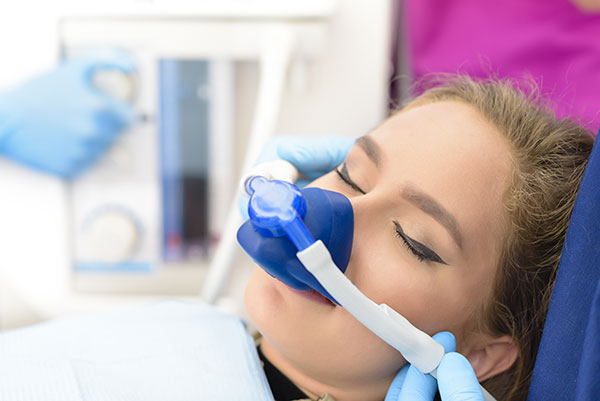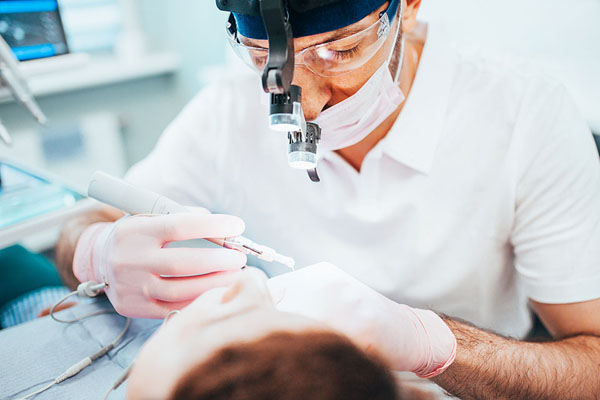Sedation Dentistry in Knoxville, TN
Sedation Dentistry Offers Relief for Dental Anxiety
Routine dental care is crucial to maintaining a healthy and confident smile. For many, the thought of undergoing dental procedures can trigger anxiety and apprehension. These situations are where sedation dentistry comes to the rescue. By offering a relaxed and comfortable experience, sedation dentistry has revolutionized how people perceive dental treatment.
At Fountain City Smiles, led by Dr. Niral Patel, our dental team offers sedation dentistry for your benefit. To schedule an appointment with our Knoxville, TN, dentist, contact us today by calling (865) 687-8670. Our dental practice in Knoxville is proud to welcome patients from the surrounding areas of Amherst, Marble City, and West Knoxville seeking quality, stress-free dental care near them.
What Is Sedation Dentistry?
Sedation dentistry, also known as sleep dentistry, is a dental practice involving the use of medications to help patients relax and remain calm during dental procedures. It’s often used for patients who experience dental anxiety, fear, or discomfort when visiting the dentist or for those undergoing lengthy or complex dental treatments.
There are different levels of sedation used in dentistry, and the choice of sedation method depends on the patient’s level of anxiety and the nature of the dental procedure.
How Does Sedation Dentistry Work?
Sedation dentistry has various types of dental sedation to accommodate different patient needs. The three primary levels of sedation are:
- Minimal Sedation: This level of sedation keeps you awake but relaxed. It’s often achieved using nitrous oxide, also known as “laughing gas.” The dentist controls the amount of gas you receive, ensuring you remain comfortable throughout the procedure.
- Moderate Sedation: With moderate sedation, you may not remember much of the procedure. This level of sedation is usually achieved through an oral sedative taken before the procedure.
- Deep Sedation: While not fully unconscious, you’ll be on the edge of consciousness during deep sedation. It’s commonly administered through intravenous (IV) medications, providing profound relaxation.
Types of Sedation Dentistry
Nitrous Oxide
Nitrous oxide, also known as laughing gas, is a commonly used sedative used to induce a state of relaxation. Administered through a mask over the nose, nitrous oxide allows you to remain awake while feeling at ease. It’s an excellent option for those with mild anxiety or who need a quick recovery after the procedure.
IV Sedation
IV sedation delivers medication directly into your bloodstream, inducing a deep state of relaxation. While you won’t be fully unconscious, you might not remember the procedure afterward. IV sedation is ideal for more complex treatments and patients with significant dental phobias.
Oral Conscious Sedation
Oral sedation is taken in pill form before the procedure, offering a higher level of relaxation than nitrous oxide. While you’re awake, you might feel drowsy and less aware. Oral sedation is particularly useful for patients with moderate anxiety or long procedures.
At Fountain City Smiles, we offer oral sedation for your benefit. If you have any questions, contact us today at (865) 687-8670.
General Anesthesia
Reserved for extensive procedures or cases where patients must be completely unconscious, general anesthesia ensures you’re asleep. An anesthesiologist administers the medication and closely monitors your vital signs. This type of sedation is typically used for oral surgeries or lengthy treatments.
Local Anesthetic
While not a form of sedation, local anesthetic has many pain-relieving effects. It involves injecting numbing medication into the treatment area, ensuring you don’t feel pain during the procedure. Local anesthetists are often combined with minimal or moderate sedation for a comprehensive comfort experience.
Benefits of Sedation Dentistry in Knoxville
The benefits of sedation dentistry make it an attractive option for many patients:
- Anxiety Relief: Dental anxiety is a real concern, often preventing individuals from seeking necessary treatments. Sedation dentistry alleviates this anxiety, making dental visits more manageable.
- Pain Management: Sedation can also include pain-relief properties, ensuring minimal discomfort during and after the procedure.
- Time Efficiency: Since patients are more relaxed, dentists can perform complex procedures more efficiently, reducing the appointments required.
- No Memory: For those with dental phobias, having little to no memory of the procedure can be a significant relief.
- Gag Reflex Control: Some individuals have an overly sensitive gag reflex, making dental procedures challenging. Sedation helps control this reflex, easing the process.
Testimonials from Our Happy Patients
“Dr. Patel is top notch. I was a new patient (only go to dentist when there’s a big problem), and the staff put me at ease. Dr. Patel & Doris both made me so comfortable even though they knew my anxiety level was high. I’m sure that as I continue to go here, I will feel safe!” – Karla L.
“Excellent cleaning and service. I have extreme anxiety and they knew exactly how to help me. Very professional, sympathetic to my needs and overall a great experience. Thank you!” – Penny H.
Candidacy For Sedation Dentistry at Fountain City Smiles
While sedation dentistry can benefit many, it might not work in certain cases. People who fall into the following categories might not be good candidates for sedation dentistry:
- Allergic Reactions: Individuals with a history of severe allergic reactions to sedative medications or any components used in the sedation process should avoid sedation dentistry.
- Certain Medical Conditions: Patients with certain medical conditions, such as severe respiratory issues (like untreated sleep apnea), heart problems, or uncontrolled high blood pressure, may not be suitable for sedation due to potential risks.
- Pregnant Women: Pregnant women are generally advised to avoid sedation dentistry, especially during the first trimester, as the effects of sedative medications on the developing fetus aren’t well understood.
- Drug Interactions: People taking certain medications, particularly those that can interact with sedatives, should consult with their healthcare provider before undergoing sedation dentistry.
Preparing for Sedation Dentistry at Our Knoxville Dental Practice Near You
Initial Consultation and Evaluation
Schedule a consultation with your dentist or oral surgeon to discuss sedation options. During this initial visit, you should provide a detailed medical history, including current medications, allergies, and any past experiences with sedation. From there, you’ll undergo a thorough dental examination to determine the necessity and suitability for sedation.
Pre-procedural Instructions
Follow specific instructions provided by Dr. Patel regarding eating, drinking, and medication intake before the procedure. Typically, we advise patients to refrain from eating or drinking anything for a specified period before sedation to prevent complications. If you take medications regularly, consult with our Knoxville dentist about whether to take them on the day of the procedure.
Fasting Guidelines
Generally, we instruct our patients to fast for a certain period before sedation to reduce the risk of aspiration during the procedure. We’ll provide clear instructions regarding fasting duration, which may vary depending on the type of sedation and the specific procedure. You should ensure compliance with fasting guidelines to ensure the safety and effectiveness of sedation.
Arrangements for Transportation and Assistance
Arrange for a responsible adult to accompany you to the appointment and drive you home afterward, as the effects of sedation may impair you. Avoid driving, operating heavy machinery, or making important decisions for at least 24 hours after sedation. You should plan for adequate rest and recovery time following the procedure and have someone available to assist you with daily activities if needed.
Dental Sedation Monitoring and Safety
No matter the type of sedation used, patient safety is paramount. Dental professionals closely monitor vital signs and adjust the sedation levels to ensure your well-being throughout the procedure.
Incorporating various types of sedation into dental practice allows for a truly patient-centric approach. Whether you have mild anxiety or require extensive treatment, sedation dentistry offers a solution to ensure your dental experience is as comfortable and stress-free as possible.
How Much Does Sedation Dentistry Cost in Knoxville?
The cost of sedation dentistry can vary widely depending on several factors, including the type of sedation used, the geographic location of the dental practice, the complexity of the dental procedure, and the dentist’s or oral surgeon’s fees. On average, the costs of sedation dentistry in Knoxville range from $25 to $1,500 or more.
Frequently Asked Questions
Safety is our top priority at Fountain City Smiles. Dr. Patel conducts thorough health assessments before recommending any sedation method. For patients with health conditions common in East Tennessee (like hypertension or respiratory issues), we take extra precautions and may consult with your primary physician. Our team is certified in monitoring vital signs and emergency procedures, ensuring your safety throughout your treatment in our Knoxville office.
For appointments with sedation at Fountain City Smiles, we recommend Knoxville patients arrange for a responsible adult to drive them to and from our office. Depending on your sedation type, you’ll need to fast for a specific period beforehand. We provide detailed pre-appointment instructions, including medication guidelines, when scheduling your arrival and departure.
Many of our Knoxville patients choose sedation dentistry specifically for its amnesic effects. With oral conscious sedation at Fountain City Smiles, most patients remember little to nothing about their dental procedure, which is ideal for those with dental anxiety. Nitrous oxide provides relaxation without significant memory loss. Dr. Patel will explain what to expect from your specific sedation choice during your consultation.
Sedation dentistry can be beneficial for children who experience dental anxiety or have difficulty cooperating during dental procedures. However, the use of sedation in children requires careful consideration and may be limited to certain cases and age groups.
Pediatric dentists and dental anesthesiologists have specialized training in managing sedation for children and will determine the appropriateness of sedation on a case-by-case basis.
Alleviate Dental Anxiety With Sedation Dentistry
Sedation dentistry has opened the doors to a more relaxed and enjoyable dental experience for countless patients. By offering various levels of sedation, this approach ensures that dental anxiety no longer stands in the way of maintaining optimal oral health. If the thought of dental procedures has kept you from seeking treatment, consider discussing sedation dentistry.
To schedule an appointment with our dentist in Knoxville, contact us today by calling (865) 687-8670. We proudly serve patients in Amherst, Marble City, and West Knoxville.



